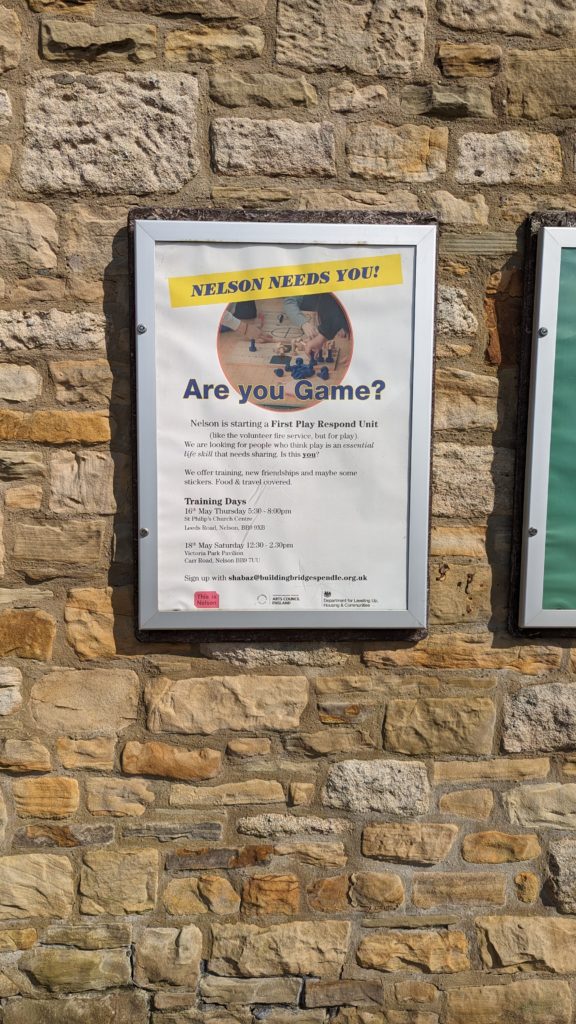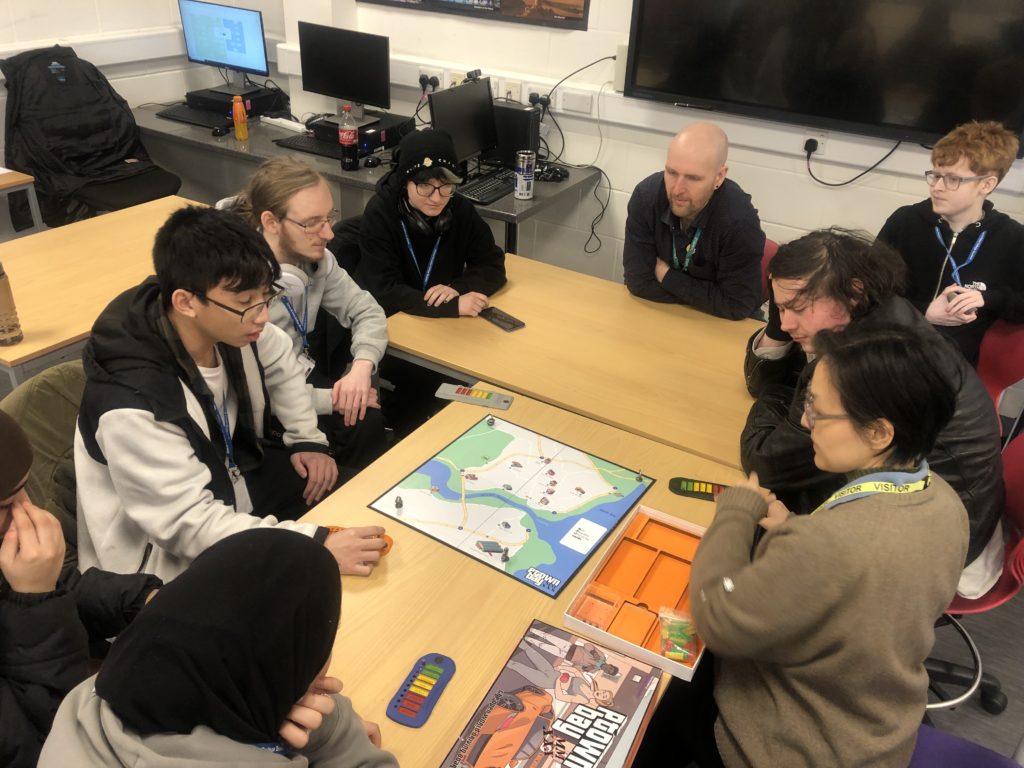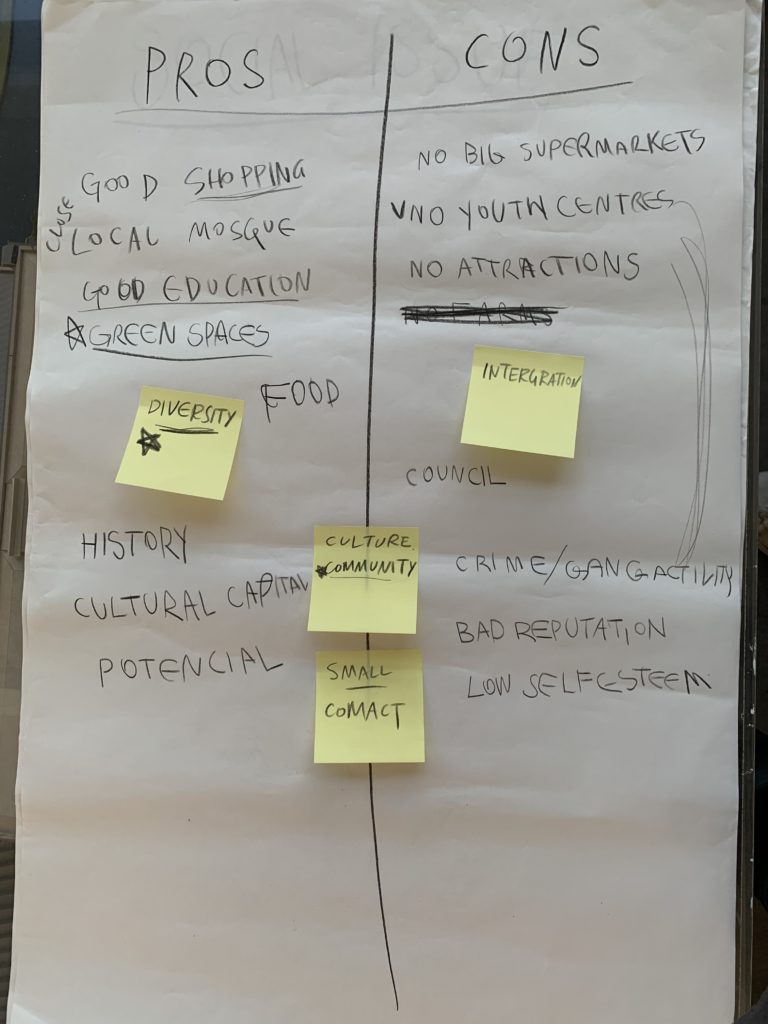I am a player. I prefer analogue (board / card) to video games. I often use games in my job as a socially engaged artist. I am super competitive, but a pretty good sport.
Games can open up a friendly space for imagination, connection, conviviality and problem solving to tackle difficult, complex social issues with fun. This is why I use games in my work.
I thought of my Nelson Reimagined residency as a game of exquisite corpse. The head was there, I was making the body, and passing on to the next person who will make it walk. I wanted my body of work to explore PLAY as an essential need (just after food, shelter and clothing). A need and skill that allows us to connect and fully enjoy our time here together.

Jumping off from the shared mapping, eating, walking and re-radicalising of the previous year, I wanted to use the momentum of the first artistic strand to create the Nelson First Play Respond Unit (FPRU) which I thought of like a “Volunteer Fire Service, but for play.” I held a few Open Play Dates at the local library and students at Nelson & Colne College to get a sense of how people of Nelson thought about the role of play in their lives. For the Open Play Dates at the library, I brought a big bag of games I made alongside classics (Monopoly Articulate!), plus 공기 stones (childhood staple from Korea), paper, pens and a big box of chalk.
I wanted to explore playground games, as opposed to games with objects, and the Open Play Date in the Childrens’ area of the library was ideal to learn what the kids these days are up to. We left all the games on a table for anyone who wanted a more quiet game time, and settled on the colourful carpet in an open circle for anyone who wanted to play as a group.
During the chaos of semi-structured play I learned kids are naturals, but adults need some coaxing to get on the floor to play. Once they do though, they fondly recall games they played when young. Due to the large South Asian community of Nelson, a lot of the games people spoke of were ones they played as children in Pakistan, and it was fun to see the similarities and divergences of similar games played with stones or shells, as well as different names for what turned out to be the same game (tag, tig, 술레잡기, chase, freeze).

The idea of starting a First Play Respond Unit (FPRU) wasn’t a hard sell, as everyone agrees play is important – to children. Or for other people. I found more reluctance when talking to adults for them to accept play as a life-long skill that is still relevant to them. I wanted to dig deeper into the reason so many have grown out of playing, and held a couple of recruitment days to get more serious about Play.
The recruitment days were to identify, develop and train people who’d like to use play to address complex social issues. The recruitment days attracted 8 people, 5 women and 3 men. All the women are Muslim, I’m not sure of the men. The age range spanned early 20s to mid 40s. We held 3 sessions in different locations, across different times and a mixture of weekday and weekends to capture a varied participant group. This was to address one of my main concerns about the project – that people have the inclination but not the capacity to take part, especially since we are more than a decade into austerity, squeezed by the cost of living crisis and living under the long shadow of the pandemic. Under these conditions, one of the most precious resources we have is time, and therefore I am always grateful for anyone who chooses to spend time with me.

The sessions started with a quick game, food and then we started delving into what issue in Nelson they wanted to address through play. We discussed the pros and cons of life in Nelson, and collated a consensus about which social issue the groups would like to focus on. Created over a few weeks, the issues boiled down to these top 3.
- Young boys on street corners
- Lack of racial integration (although lots of diversity)
- Men’s mental health
All of these issues are important, but what is the most interesting for the people who are actually in FPRU? For many in the group, it was about young boys with nowhere to go, but I was very reluctant to focus on this topic without any young men to present their side of the story.
I’m guided by the principle of ‘Nothing about us without us’ that anchors the disability rights movement, and I use this approach when working in the Criminal Justice System. It’s mostly within the Criminal Justice System that I used games – specifically boardgames – to reflect on how our society thinks about crime and punishment. Co-creating a game with people on the receiving end, and then playing that game with the people in positions of power is the ultimate goal for me. This is why it’s important to me when I’m co-creating a game that the stories we tell about social issues are from the perspective of people experiencing those issues, who are often on the margins. Often the ones most affected, but with the least agency.
I proposed starting a FPRU rather than make a game about Nelson, because I wanted to leave behind skills in people, rather than an object (that may or may not be played). After the recruitment days exploring methods and ideas, I have my first conscript.
S, a young woman who’s newly arrived to Nelson would like to start the FPRU with her peers at the This Is Nelson youth group. I’m ready to support her, and see where it goes.